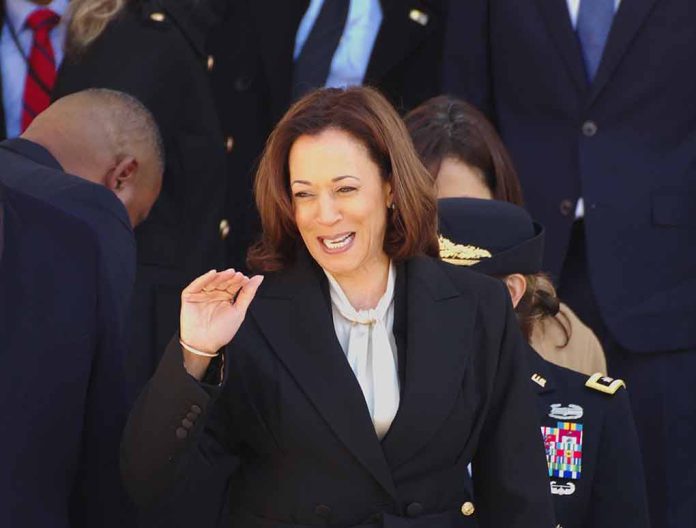
Vice President Kamala Harris faces scrutiny over a $50,000 campaign donation from a Chinese executive with ties to the Chinese Communist Party, raising concerns about foreign influence in American politics.
At a Glance
- BYD executive Stella Ke Li donated $50,000 to Harris’s campaign
- BYD received $395,000 in U.S. government funding months after the donation
- BYD has documented ties to the Chinese Communist Party
- Congress is investigating BYD over potential espionage concerns
- The controversy raises questions about national security and campaign finance
Campaign Donations and Government Funding Raise Eyebrows
Vice President Kamala Harris’s campaign is under fire after reports surfaced of a substantial donation from Stella Ke Li, a senior executive at BYD, a Chinese electric vehicle manufacturer with known ties to the Chinese Communist Party (CCP). The $50,000 contribution to Harris’s presidential campaign came just six months before the Biden-Harris administration allocated $395,000 to BYD through the Clean School Bus program.
This sequence of events has sparked concerns about potential foreign influence in American politics and the ethical implications of accepting donations from executives linked to companies with ties to foreign governments.
How Kamala Harris Allowed a Suspected Chinese Spy to Interfere in a Key California Election
Several of those same supporters donated tens of thousands of dollars to Harris’s political campaigns before and after the scheme was exposed.https://t.co/WqFdPDdL8S
— Steve Gruber (@stevegrubershow) October 23, 2024
Additional Contributions and National Security Concerns
The donation to Harris’s campaign was not an isolated incident. Reports indicate that Ke Li also contributed $25,000 to the Biden Victory Fund, $18,400 to the Democratic National Committee, and $6,600 to the Biden campaign. These substantial contributions from an executive with ties to a company considered a national security threat have raised red flags among critics and watchdog groups.
“BYD collaborates with military affiliates on significant projects, including data aggregation from vehicles and technology sharing with state-owned enterprises.” – Driving Force Action PAC
BYD’s connections to the CCP and its collaboration with Chinese military affiliates have led to serious concerns about national security. Congress is currently investigating the company over espionage concerns, including potential data collection and spying through its vehicles in the United States.
NEWS ALERT: Unearthed posts expose close ties between Kamala Harris friend running for US Congress and a top Chinese executive https://t.co/FbdN45JfII
— DMLNewsApp (@DMLNewsApp) October 22, 2024
Calls for Action and Political Implications
The Driving Force Action PAC has launched an advertising campaign in swing states, demanding that Vice President Harris return the funds and sever financial ties with BYD. The controversy has implications beyond campaign finance, touching on broader issues of national security and American manufacturing independence.
“The acceptance of political contributions from an executive of a company with such ties to the CCP raises serious ethical and national security concerns.” – Driving Force Action PAC
Critics argue that accepting contributions from BYD contradicts Harris’s previous stance on reducing reliance on foreign adversaries for critical industries. The issue has become intertwined with the debate over electric vehicle mandates, which some argue could threaten American auto industry jobs.
Electric Vehicle Industry Challenges
As this controversy unfolds, the electric vehicle industry faces its own set of challenges. Major automakers are adjusting their EV production plans in response to market conditions. Toyota has delayed its US electric car production from 2025 to 2026, citing slowing global demand. Stellantis is facing production challenges, with CEO Carlos Tavares set to address Italy’s parliament following a production suspension of the Fiat 500 EV due to weak demand.
“TWO THIRDS OF CANADIANS SAY BANNING CONVENTIONAL VEHICLES BY 2035 IS “UNREALISTIC”” – Montreal Economic Institute (MEI) and Ipsos
Public skepticism about the transition to electric vehicles is growing. A survey by the Montreal Economic Institute and Ipsos found that two-thirds of Canadians believe banning conventional vehicles by 2035 is unrealistic. This sentiment, combined with challenges such as battery reliability issues and limited charging infrastructure, presents significant hurdles for the EV industry and policymakers pushing for rapid adoption.
As the 2024 election approaches, the controversy surrounding Vice President Harris’s campaign donations from BYD executives and the broader debate over electric vehicle policies are likely to remain key issues, influencing both national security discussions and economic policy debates.
Sources:
- Report: Kamala Harris Accepted Donations from Chinese Auto Executive Linked to CCP
- New DFA Ad Calls Out Kamala Harris for Accepting $50,000 from Chinese Executive with Communist Party Ties
- These Places Have Democracy Watchdogs Bracing for Potential Election Discord
- Kamala Campaign Under Fire for Taking Money From Chinese Auto Exec



